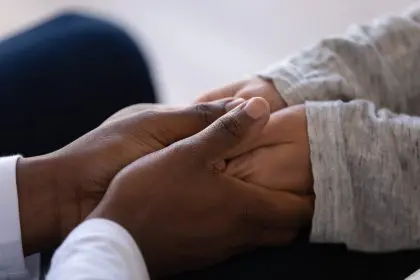Unresolved relationships can leave deep emotional scars, forcing individuals to carry the burden of silence. It’s an experience that many endure without openly discussing it, and often the emotional weight becomes too heavy to bear. While some choose to walk away, others linger in emotional limbo, trapped in a cycle of unresolved feelings and unspoken words. But why do unresolved relationships make lovers suffer in silence, and what can be done to break this cycle? This article delves into the complexities of unresolved relationships and the emotional turmoil they can cause.
The weight of unfinished conversations
Unresolved relationships often stem from unfinished conversations. These are the words that linger long after an argument, a breakup or a misunderstanding. When two people fail to communicate effectively, the emotional residue remains, fostering resentment, confusion, and frustration.
Communication is at the heart of every relationship, and when it’s compromised, unresolved issues begin to fester. Without clarity, individuals are left to interpret what went wrong, often blaming themselves or the other person. This internal narrative becomes a source of emotional pain, as unresolved questions spiral out of control. Why didn’t they call? Why did the relationship end without closure? These unanswered questions can make lovers suffer in silence, with no clear path to healing.
The hidden cost
One of the most damaging aspects of unresolved relationships is emotional suppression. People often feel that voicing their feelings might lead to further conflict or rejection, so they bury their emotions deep within. While this might seem like an act of self-preservation, it ultimately leads to more harm than good.
Suppressing emotions creates a ticking time bomb of unresolved pain. Those who hold onto their feelings often experience anxiety, depression or a sense of emptiness. By not expressing how they truly feel, they are denying themselves the opportunity to heal. Emotional suppression can lead to physical symptoms as well — headaches, fatigue or even weakened immune systems — since the body and mind are intricately connected. Silence, in this context, becomes a form of suffering.
The fear of confrontation
Many individuals in unresolved relationships avoid confrontation because they fear the outcome. They worry that expressing their feelings will either escalate the situation or lead to rejection. This fear paralyzes them, leaving them unable to address the core issues that could provide resolution.
Fear of confrontation causes lovers to isolate emotionally. Instead of confronting their partner or former lover, they withdraw, convincing themselves that it’s better to stay silent than to risk further pain. This isolation only deepens the emotional wound, as they are left alone with their thoughts, replaying moments and regretting actions they didn’t take. Over time, this leads to feelings of inadequacy and self-doubt — which can become toxic to their well-being.
Holding onto hope
In many unresolved relationships, one or both partners may hold onto the hope that things will resolve on their own. This hope can act as both a source of comfort and a barrier to moving on. While it provides a temporary sense of solace, it also prevents individuals from fully accepting the situation and healing from it.
Hope can be a powerful motivator, but when it comes to unresolved relationships, it can also be a trap. People often cling to the idea that the relationship will somehow work itself out, even when all signs point to the contrary. This false hope prolongs the suffering, as it keeps individuals stuck in an emotional limbo. Instead of accepting reality, they continue to live in a state of denial, waiting for the other person to come back or for the situation to change. This can delay the healing process — making it harder to move on.
The impact on future relationships
Unresolved relationships don’t just affect the people involved at the moment—they can have lasting impacts on future relationships as well. When someone carries unresolved baggage from a previous relationship, they may project their insecurities, fears and unresolved issues onto their new partner.
Carrying unresolved emotions into a new relationship often leads to patterns of distrust, fear of abandonment and emotional distance. Individuals who haven’t resolved their past may struggle to open up to their new partner — fearing a repeat of their previous experience. This creates a cycle of emotional detachment — where new relationships are built on shaky foundations. In the end, unresolved relationships can sabotage future happiness by preventing individuals from fully engaging with their new partners.
Breaking the silence
The good news is that unresolved relationships don’t have to be a life sentence. There are steps lovers can take to heal from the pain and break free from the silence.
- Acknowledge the pain: The first step toward healing is acknowledging the pain. It’s essential to recognize that silence isn’t strength — it’s avoidance. By admitting that the unresolved relationship has caused emotional harm, individuals can begin to take steps toward recovery.
- Seek closure, if possible: While closure isn’t always attainable, it’s worth seeking. This could involve having a final conversation with the other person or writing a letter (whether or not it’s sent). Expressing feelings can provide a sense of relief and allow individuals to move on.
- Focus on self-healing: Healing starts from within. Taking care of mental and emotional well-being through therapy, journaling or talking to friends can provide the support needed to move past unresolved issues.
- Let go of what can’t be controlled: It’s important to remember that not every relationship will have a happy ending. Letting go of the need for control or resolution in situations where it’s not possible is crucial for emotional freedom.
- Open up to new possibilities: Once healing has begun, it’s essential to stay open to new possibilities. New relationships should be approached with a fresh perspective — free from the baggage of the past.
Moving beyond the silence
Unresolved relationships can create emotional wounds that linger for years, causing lovers to suffer in silence. However, by understanding the causes of this suffering — whether it’s communication breakdowns, emotional suppression, fear of confrontation or clinging to false hope — individuals can begin to take steps toward healing. It’s a challenging process, but one that is essential for emotional well-being. Silence doesn’t have to be the final word in unresolved relationships. By breaking free from the chains of unspoken feelings, individuals can find peace and pave the way for healthier, more fulfilling connections in the future.
This story was created using AI technology.












